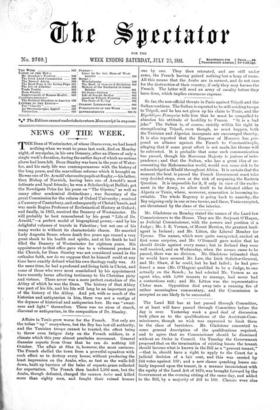NEWS OF THE WEEK.
THE Dean of Westminster, of whose illness even, we had heard nothing when we went to press last week, died on Monday night, of erysipelas, in his own Deanery, after an illness of only a single week's duration, during the earlier days of which no serious alarm had been felt. Dean Stanley was born in the year of Water- loo, and his early life was contemporaneous with the history of -the long peace, and the marvellous reforms which it brought us. He was one of Dr. Arnold's favourite pupils at Rugby,—his father, then Bishop of Norwich, having been one of Arnold's most intimate and loyal friends ; he won a Scholarship at Balliol ; got -the Newdigate Prize for his poem on "The Gipsies," as well as „many other academical distinctions ; was Secretary of the great Commission for the reform of Oxford University ; received a Canonry of Canterbury, and subsequently of Christ Church, and was made Regius Professor of Ecclesiastical History at Oxford ; and finally, in 1863, received the Deanery of Westminster. He will probably be best remembered by his great "Life of Dr. .A.rnold,"—a perfect model of biographical power,—and by his .delightful volumes of travels in Palestine ; but not one of his many works is without its characteristic eharm. He married Lady Augusta Bruce, whose death five years ago caused a very great shock to his health and spirits, and at his death he had filled the Deanery of Westminster for eighteen years. His .appointment to that office gave rise to a vehement protest in the Church, for Dean Stanley was not considered sound in the ,orthodox faith, nor do we suppose that he himself could at any time have exactly defined what his own theology really was. At the same time, he had a profound and living faith in Christ, and some of those who were most scandalised by his appointment have recently borne affecting testimony to his Christian piety and virtues. There never was a more perfect custodian of the Abbey of which he was the Dean. The history of that Abbey was part of his life, and his life will long be an important part of the history of the Abbey. And yet, with so much of the historian and antiquarian in him, there was not a vestige of the dryness of historical and antiquarian lore. He was "sweet- ness and light" themselves. There was no atom of starch, diaconal or antiquarian, in the composition of Dr. Stanley.


































